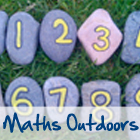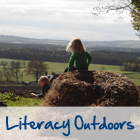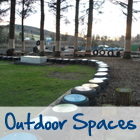
In July 2017, Ian Gilbert quietly published The Compleat Thunks Book which is his third on the topic. This is a form of question where the thinking, reasoning, logic, panic and irritation used to arrive at an answer, or deviate from it, creates conversations that make our brains go “ooh, ah and ouch!”!
During my visit to Hong Kong the previous year, we got onto the subject of Thunks and Ian asked “If you are in a cave, is that outdoor learning?” To be honest, I still don’t know! Maybe it is and maybe it isn’t. Since then, I’ve spent plenty of time wondering.
Naturally the topic of outdoor learning and play gives rise to many more thunks. Below is a list co-created by Ian and myself for your amusement and frustration. For me, what I like is that not only do I find myself trying to rationalise my responses, there is also an emotional element to my comments. Often this is certainty, sadness, anger, a chuckle and so on. It can also be an incentive for me to phone a friend or look up something online.
We hope you use these with children and young people with whom you work to have conversations about learning and play outdoors, especially when outside or perhaps before and after an outdoor session. You may also find they are good fillers when having fun outside with your own friends and family. Perhaps these Thunks will be a catalyst for you or your class for creating many more. Please do tweet about them to Ian, who can trip them off his tongue faster than licking an ice-cream.
- Is a mediocre outside lesson better for us than a great indoor lesson?
- Can any activity be made unadventurous?
- Can you make a hazard go away?
- If it’s dangerous but nothing bad happens was it dangerous?
- If one child does not want to go outside, should the whole class be kept inside?
- Is it still the same class if one child stays inside while the rest are outside?
- Should there be fewer rules outside rather than more?
- Is stopping a child playing a bigger punishment than making them work?
- Is it better to wear out one piece of woodland site rather than impact the wider environment?
- Should a child be made to get wet if they have forgotten to bring a jacket?
- Should the adults be punished for what the child forgets?
- If one week in a residential centre has the same impact as one term in a school, should we just send children on a residential experience for a month every year instead of going to school?
- Can you have a Forest School without trees?
- Can learning not happen outdoors?
- Is more of the learning accidental when you are outside?
- Is it up to the teacher to decide if a class goes outside to learn?
- Is the classroom bigger when the door is open?
- Is the outdoors smaller when the door is open?
- Are humans man-made, more than they are natural?
- Are you really outside when you are in a tent?
- Are you really outside when you are wearing a hat?
- Is the school building simply the changing rooms for the outside classroom?
- Are the rugby players playing outside if the roof is on the stadium?
- Does Wimbledon’s Centre Court become a room when the roof goes on?
- Are small animals the last to know when it stops raining?
- If I break a stick into three, do I still have a stick?
- Is a ploughed field more maths than art?
- Is there less sky on a cloudy day?
- Are wild animals taught?
- Are birds simply speaking?
- Do you need to know what it’s called to say you’ve seen it?
- Is life more real outside?
- Can you say where the outside starts?
- Can you touch the wind?
- Can you touch a rainbow?
- Can we really know if every snowflake is different?
- If every snowflake is different, is every snow angel?
- Can you measure the coast?
- Are there more islands when the tide comes in?
- Does the horizon get higher when the tide goes out?
- Does a butterfly know where it’s going?
- Can a fly see a skyscraper?
- Are birds’ nests designed?
- Is outdoor learning a subject?
- Is anything not natural?
Finally, if you want to know more about Ian, have a look at Independent Thinking Ltd, which he founded over 20 years ago and check out all the books he’s written, edited or co-authored on Amazon. He also came up with the title Dirty Teaching for my book 🙂
This blog post was originally published in October 2017.




















Love these questions. Great for those moments when you wish to flip your thinking. And yes you can have forest school without trees as it is the technique linked to how you use the place where you are. The first forest school was in a field. I would say a few trees would improve the experience as trees create a different magic about the place…. and I work with trees so I would say that!!
Thanks Sally – I think the questions are a lot of fun and good for conversations at all levels. Your explanation of Forest School without a forest is nice and concise.
Love these thunking things Juliet…here’s one…
What is the value of visiting a class once doing a great session with a real buzz…wgen lots of A-ha moments happen….does this leave the teacher of said class empowered or disempowered…? Done lots of lessons this week followed by teacher training/debriefing and I still wander as a new fresh face who is well practised in his/her own stuff is always at an advantage!
Agreed – it’s a professional thunk! I think it depends on the wrap-around care for the teacher – support before and after as part of a package so they can continue to develop their outdoor practice. I like to go in as an equal and have teachers also lead the teaching outside whilst I support them so that they do actively engage in the act of planning and working outside. Also much depends on the ethos within the school – if the school leaders are expecting teachers to take their classes outside then setting aside time to reflect, evaluate impact, link to ongoing classwork has to be made and actively monitored. Phew! Big response!
This is great Juliet! Thanks for sharing some great provocative questions from Ian Gilbert. I think these would be good to use as icebreakers or closing questions for CPD sessions. I will add this as a ‘news’ item to the OL Directory if that’s OK. My (seasonal) questions are ‘is an autumn day art?’ and ‘ do trees know when they have lost all their leaves?’ and finally, as I’m stuck at a computer – ‘ are you outside when you can look out of a window?’….
Yes – I liked their potential for training . Please do add this to the news items for the OL directory. I also loved your thunks – and in response to your last one… does it depend on whether the window is open or closed… 🙂